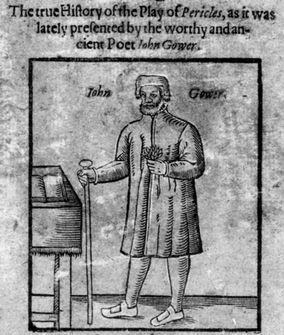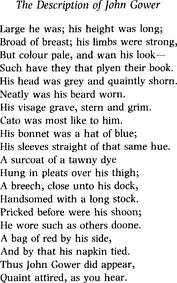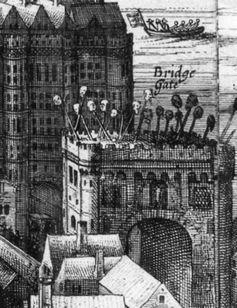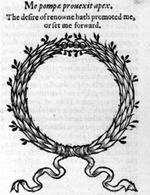William Shakespeare: The Complete Works 2nd Edition (478 page)
Read William Shakespeare: The Complete Works 2nd Edition Online
Authors: William Shakespeare
Tags: #Drama, #Literary Criticism, #Shakespeare

BOOK: William Shakespeare: The Complete Works 2nd Edition
10.36Mb size Format: txt, pdf, ePub
KING
Where did you buy it? Or who gave it you?
DIANA
It was not given me, nor I did not buy it.
KING
Who lent it you?
DIANA
It was not lent me neither.
KING
Where did you find it then?
DIANA
I found it not.
KING
If it were yours by none of all these ways,
How could you give it him?
How could you give it him?
DIANA
I never gave it him.
LAFEU
(to the King)
This woman’s an easy glove, my lord, she goes off and on at pleasure.
(to the King)
This woman’s an easy glove, my lord, she goes off and on at pleasure.
KING
(to Diana)
(to Diana)
This ring was mine. I gave it his first wife.
DIANA
It might be yours or hers for aught I know.
KING
(to attendants)
(to attendants)
Take her away, I do not like her now.
To prison with her. And away with him.—
Unless thou tell’st me where thou hadst this ring
Thou diest within this hour.
To prison with her. And away with him.—
Unless thou tell’st me where thou hadst this ring
Thou diest within this hour.
DIANA
I’ll never tell you.
KING
(to attendants)
(to attendants)
Take her away.
DIANA
I’ll put in bail, my liege.
KING
I think thee now some common customer.
DIANA
By Jove, if ever I knew man ’twas you.
KING
Wherefore hast thou accused him all this while?
DIANA
Because he’s guilty, and he is not guilty.
He knows I am no maid, and he’ll swear to’t;
I’ll swear I am a maid, and he knows not.
Great King, I am no strumpet; by my life,
I am either maid or else this old man’s wife.
He knows I am no maid, and he’ll swear to’t;
I’ll swear I am a maid, and he knows not.
Great King, I am no strumpet; by my life,
I am either maid or else this old man’s wife.
KING (
to attendants
)
to attendants
)
She does abuse our ears. To prison with her.
DIANA
Good mother, fetch my bail.
Exit Widow
Stay, royal sir.
The jeweller that owes the ring is sent for,
And he shall surety me. But for this lord,
Who hath abused me as he knows himself,
Though yet he never harmed me, here I quit him.
He knows himself my bed he hath defiled,
And at that time he got his wife with child.
Dead though she be she feels her young one kick.
So there’s my riddle; one that’s dead is quick.
And now behold the meaning.
The jeweller that owes the ring is sent for,
And he shall surety me. But for this lord,
Who hath abused me as he knows himself,
Though yet he never harmed me, here I quit him.
He knows himself my bed he hath defiled,
And at that time he got his wife with child.
Dead though she be she feels her young one kick.
So there’s my riddle; one that’s dead is quick.
And now behold the meaning.
Enter Helen and the Widow
KING
Is there no exorcist
Beguiles the truer office of mine eyes?
Is’t real that I see?
Is’t real that I see?
HELEN
No, my good lord,
’Tis but the shadow of a wife you see,
The name and not the thing.
The name and not the thing.
BERTRAM
Both, both. O, pardon!
HELEN
O, my good lord, when I was like this maid
I found you wondrous kind. There is your ring.
And, look you, here’s your letter. This it says:
‘When from my finger you can get this ring,
And are by me with child,’ et cetera. This is done.
Will you be mine now you are doubly won?
I found you wondrous kind. There is your ring.
And, look you, here’s your letter. This it says:
‘When from my finger you can get this ring,
And are by me with child,’ et cetera. This is done.
Will you be mine now you are doubly won?
BERTRAM
(to the King)
(to the King)
If she, my liege, can make me know this clearly
I’ll love her dearly, ever ever dearly.
I’ll love her dearly, ever ever dearly.
HELEN
If it appear not plain and prove untrue,
Deadly divorce step between me and you.—
O my dear mother, do I see you living?
Deadly divorce step between me and you.—
O my dear mother, do I see you living?
LAFEU
Mine eyes smell onions, I shall weep anon.
(To Paroles)
Good Tom Drum, lend me a handkerchief.
So, I thank thee. Wait on me home, I’ll make sport
with thee. Let thy curtsies alone, they are scurvy ones.
(To Paroles)
Good Tom Drum, lend me a handkerchief.
So, I thank thee. Wait on me home, I’ll make sport
with thee. Let thy curtsies alone, they are scurvy ones.
KING
(to Helen)
(to Helen)
Let us from point to point this story know
To make the even truth in pleasure flow.
(
To Diana)
If thou be‘st yet a fresh uncroppèd flower,
Choose thou thy husband and I’ll pay thy dower.
For I can guess that by thy honest aid
Thou kept’st a wife herself, thyself a maid.
Of that and all the progress more and less
Resolvèdly more leisure shall express.
All yet seems well; and if it end so meet,
The bitter past, more welcome is the sweet.
To make the even truth in pleasure flow.
(
To Diana)
If thou be‘st yet a fresh uncroppèd flower,
Choose thou thy husband and I’ll pay thy dower.
For I can guess that by thy honest aid
Thou kept’st a wife herself, thyself a maid.
Of that and all the progress more and less
Resolvèdly more leisure shall express.
All yet seems well; and if it end so meet,
The bitter past, more welcome is the sweet.
Flourish of trumpets
Epilogue
The King’s a beggar now the play is done.
All is well ended if this suit be won:
That you express content, which we will pay
With strife to please you, day exceeding day.
Ours be your patience then, and yours our parts:
Your gentle hands lend us, and take our hearts.
All is well ended if this suit be won:
That you express content, which we will pay
With strife to please you, day exceeding day.
Ours be your patience then, and yours our parts:
Your gentle hands lend us, and take our hearts.
Exeunt
PERICLES
BY WILLIAM SHAKESPEARE AND GEORGE WILKINS A RECONSTRUCTED TEXT
ON 20 May 1608
Pericles
was entered on the Stationers’ Register to Edward Blount; but he did not publish it. Probably the players allowed him to license it in the hope of preventing its publication by anyone else, for it was one of the most popular plays of the period. Its success was exploited, also in 1608, by the publication of a novel, by George Wilkins, ‘The Painful Adventures of Pericles Prince of Tyre, Being the True History of the Play of Pericles, as it was lately presented by the worthy and ancient poet John Gower’. The play itself appeared in print in the following year, with an ascription to Shakespeare, but in a manifestly corrupt text that gives every sign of having been put together from memory. This quarto was several times reprinted, but the play was not included in the 1623 Folio (perhaps because Heminges and Condell knew that Shakespeare was responsible for only part of it).
Pericles
was entered on the Stationers’ Register to Edward Blount; but he did not publish it. Probably the players allowed him to license it in the hope of preventing its publication by anyone else, for it was one of the most popular plays of the period. Its success was exploited, also in 1608, by the publication of a novel, by George Wilkins, ‘The Painful Adventures of Pericles Prince of Tyre, Being the True History of the Play of Pericles, as it was lately presented by the worthy and ancient poet John Gower’. The play itself appeared in print in the following year, with an ascription to Shakespeare, but in a manifestly corrupt text that gives every sign of having been put together from memory. This quarto was several times reprinted, but the play was not included in the 1623 Folio (perhaps because Heminges and Condell knew that Shakespeare was responsible for only part of it).
In putting together The Painful Adventures, Wilkins drew on an earlier version of the tale, The Pattern of Painful Adventures, by Laurence Twine, written in the mid-1570s and reprinted in 1607. Twine’s book is also a source of the play, which draws too on the story of Apollonius of Tyre as told by John Gower in his
Confessio Amantis,
and, to a lesser extent, on Sir Philip Sidney’s Arcadia. Wilkins not only incorporated verbatim passages from Twine’s book, he also drew heavily on
Pericles
itself. Since the play text is so corrupt, it is quite likely that Wilkins reports parts of it both more accurately and more fully than the quarto. And he may have had special qualifications for doing so. He was a dramatist whose popular play The Miseries of Enforced Marriage had been performed by Shakespeare’s company.
Pericles
has usually been regarded as either a collaborative play or one in which Shakespeare revised a pre-existing script. Our edition is based on the hypothesis (not new) that Wilkins was its joint author. Our attempt to reconstruct the play draws more heavily than is usual on Wilkins’s novel, especially in the first nine scenes (which he probably wrote); in general, because of its obvious corruption, the original text is more freely emended than usual. So that readers may experience the play as originally printed, an unemended reprint of the 1609 quarto is given in our original-spelling edition. The deficiencies of the text are in part compensated for by the survival of an unusual amount of relevant visual material, reproduced overleaf.
Confessio Amantis,
and, to a lesser extent, on Sir Philip Sidney’s Arcadia. Wilkins not only incorporated verbatim passages from Twine’s book, he also drew heavily on
Pericles
itself. Since the play text is so corrupt, it is quite likely that Wilkins reports parts of it both more accurately and more fully than the quarto. And he may have had special qualifications for doing so. He was a dramatist whose popular play The Miseries of Enforced Marriage had been performed by Shakespeare’s company.
Pericles
has usually been regarded as either a collaborative play or one in which Shakespeare revised a pre-existing script. Our edition is based on the hypothesis (not new) that Wilkins was its joint author. Our attempt to reconstruct the play draws more heavily than is usual on Wilkins’s novel, especially in the first nine scenes (which he probably wrote); in general, because of its obvious corruption, the original text is more freely emended than usual. So that readers may experience the play as originally printed, an unemended reprint of the 1609 quarto is given in our original-spelling edition. The deficiencies of the text are in part compensated for by the survival of an unusual amount of relevant visual material, reproduced overleaf.
The complex textual background of
Pericles
should not be allowed to draw attention away from the merits of this dramatic romance, which we hope will be more apparent as the result of our treatment of the text. If the original play had survived, it might well have been as highly valued as
The Winter’s Tale
or
The Tempest
; as it is, it contains some hauntingly beautiful episodes, above all that in Scene 21 in which Marina, Pericles’ long-lost daughter, draws him out of the comatose state to which his sufferings have reduced him.
Pericles
should not be allowed to draw attention away from the merits of this dramatic romance, which we hope will be more apparent as the result of our treatment of the text. If the original play had survived, it might well have been as highly valued as
The Winter’s Tale
or
The Tempest
; as it is, it contains some hauntingly beautiful episodes, above all that in Scene 21 in which Marina, Pericles’ long-lost daughter, draws him out of the comatose state to which his sufferings have reduced him.
14. From the title-page
of The Painful Adventures of Pericles Prince of Tyre
(1608), by George Wilkins; artist unknown. Since Gower is not a character in Wilkins’s novel, the choice of woodcut undoubtedly reflects both the play’s popularity and Gower’s own impact in early performances, and it is as likely to reflect the visual detail of performance as any early title-page. The sprig of laurel (or posy) in Gower’s left hand is symbolic of his poetic status.
of The Painful Adventures of Pericles Prince of Tyre
(1608), by George Wilkins; artist unknown. Since Gower is not a character in Wilkins’s novel, the choice of woodcut undoubtedly reflects both the play’s popularity and Gower’s own impact in early performances, and it is as likely to reflect the visual detail of performance as any early title-page. The sprig of laurel (or posy) in Gower’s left hand is symbolic of his poetic status.

15.
From
Greene’s Vision
(1592), sig. CI
r
―CI
v
; probably by Robert Greene. The description here fits reasonably well the
Painful Adventures
title-page, though the woodcut does not contain the ‘bag of red’, ‘napkin’, or tight-fitting ‘breech’.
From
Greene’s Vision
(1592), sig. CI
r
―CI
v
; probably by Robert Greene. The description here fits reasonably well the
Painful Adventures
title-page, though the woodcut does not contain the ‘bag of red’, ‘napkin’, or tight-fitting ‘breech’.

16.
Severed heads displayed on the gate of London Bridge, from an etching by Claes Jan Visscher (1616). In the play’s sources, and
Painful Adventures,
the heads of previous suitors (Sc. 1) are placed on the ’gate’ of Antioch. In performance they could have been thrust out on poles from the upper stage; but the timing and method of their display is not clear.
Severed heads displayed on the gate of London Bridge, from an etching by Claes Jan Visscher (1616). In the play’s sources, and
Painful Adventures,
the heads of previous suitors (Sc. 1) are placed on the ’gate’ of Antioch. In performance they could have been thrust out on poles from the upper stage; but the timing and method of their display is not clear.

17.
From The Heroical Devices of M. Claudius Paradin,
translated by P.S. (1591), sig. V3. This is the source for the impresa of the Third Knight, in Sc. 6.
From The Heroical Devices of M. Claudius Paradin,
translated by P.S. (1591), sig. V3. This is the source for the impresa of the Third Knight, in Sc. 6.

Other books
The Railway Police and the Last Trolley Ride by Hortense Calisher
Victims by Collin Wilcox
Charlie’s Apprentice by Brian Freemantle
Stowaway by Emma Bennett
Surrender: Tales of Submission by Eden Bradley
The Painting by Schuyler, Nina
The Merchant and the Alchemist's Gate by Ted Chiang
Orfe by Cynthia Voigt
Vexing the Viscount by Christie Kelley
Resolution by Ben Winston
